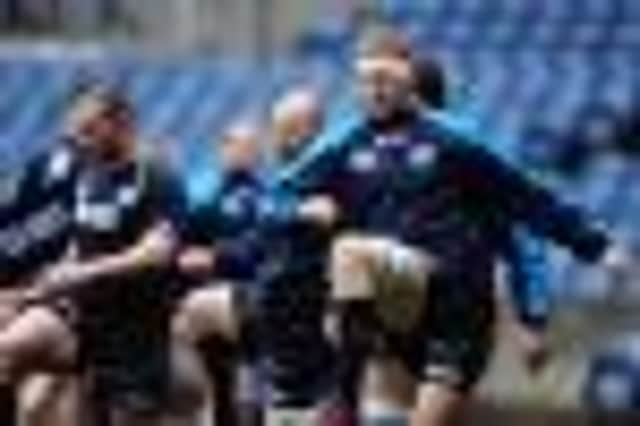Allan Massie: Scots have firepower to beat Wales


It’s very different today. Nevertheless, it’s still the case most years in the Six Nations that around two-thirds of matches are won by the home team. Scotland’s record since the Five Nations became Six in 2000 has been dismal. Murrayfield has hardly been a fortress. All the same, our home record has been better than the away one.
Wales come north today with a recent record which makes all talk of home advantage seem ridiculous. They have won their last four away games in the Six Nations – and lost their last five internationals in Cardiff. This is bizarre – even if you add the qualification that the Cardiff defeats includes matches against Australia, South Africa and New Zealand. Then, at home on the opening day of this year’s tournament, they found themselves down 3-30 to Ireland five minutes into the second-half. At that point, the game turned round, Wales dominating the last half-hour, scoring three tries and losing only 22-30. They went on to beat France in Paris in what was a desperately poor match, redeemed from utter mediocrity only by a neat Welsh try near the end, and followed this by a victory in heavy rain in Rome against an Italian side without their captain, Sergio Parisse.
Advertisement
Hide AdAdvertisement
Hide AdThe most impressive feature of the Welsh play that afternoon was their scrummaging, the veteran Italian props, Martin Castrogiovanni and Andrea Lo Cicero having one of the most uncomfortable afternoons of their career. The upshot is that Wales have now won two matches out of three and still have a chance of the championship, even though they have not been playing particularly well.
Scotland are in the same position in the table, and yet, admirable in many respects as the victory against Ireland was, it was achieved in a manner unlikely to be repeated. Too much can be made of statistics, which are anyway subject to varying interpretation; nevertheless, it is very rare for a team to win a rugby match – at any level – with as small a share of the ball as Scotland had two weeks ago.
Consequently, both teams today are in a similar position, recent results having arguably been better than performances. For both, victory in these matches has been all-important in view of recent history. But both will hope to be able to show that they are capable of playing in a more expansive style today.
Wales have much-vaunted backs, two huge wings in George North and Alex Cuthbert, and the outstanding full back of the tournament so far in Leigh Halfpennny. Their fly-half, Dan Biggar, has been gaining authority with each match, but their centres, Jamie Roberts and Jonathan Davies, have been disappointing, and, at scrum-half, Mike Phillips has been struggling. Their pack, despite being weakened by injuries has been effective, but not dominating, except in the tight against Italy. It may be that the best has not yet been seen of Wales this season, or it may be the team is not capable of reproducing the form that secured the Grand Slam last year.
The Scotland match in Cardiff last season was an odd affair. We lost because of a couple of silly mistakes and a couple of sin-binnings. Otherwise, there was little between the teams. One thought even then that what Scotland chiefly lacked was confidence in their ability to win. Some confidence should now have been restored. Scott Johnson has apparently instilled an upbeat feeling.
Ruaridh Jackson is unlucky to have lost his place at fly-half, having had so little opportunity against Ireland. Still, many are happy to see his Glasgow clubmate Duncan Weir promoted. He seems to have greater self-confidence than Jackson, and he certainly kicks the ball a long way. Clearly we intend to play as much of the match as possible in the Welsh half – a good idea given Halfpenny’s ability to kick long-distance goals.
Jackson missed a couple of tackles against Ireland, but, from what I’ve seen of the two, is usually a more reliable defender than Weir. There is plenty of running ability in the Scotland back-line. So one hopes Weir will also spread the ball when the opportunity arises. He‘s an interesting player. People whose memories stretch back more than half a century may be reminded of another Glasgow fly-half, Angus Cameron, the vice-captain of the 1955 Lions. Cameron was a stocky player, with a sharp rugby brain and a mighty boot.
I think we want to make this Welsh pack run about the field. There are a few veterans there. It’s impossible to predict how the set scrum will go, and not only because so much depends on how it is refereed, but we may have an advantage at the line-out. As so often, the outcome may be determined by the competition in the back row. Wales have rather surprisingly recalled their former captain, Sam Warburton, in place of Justin Tipuric, who has been in fine form. Two years ago, Warburton was perhaps the best No 7 in the championship; a succession of injuries has resulted in a loss of form.
Advertisement
Hide AdAdvertisement
Hide AdWales will start as favourites if only because they have regularly beaten us over the last decade. But so had Ireland – and they came to Murrayfield and lost. If we don’t concede kickable penalties, then we have enough determination and firepower to win. Sadly, as so often nowadays, the result may be decided by how the referee, Craig Joubert, interprets and applies the laws.